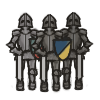End of turn adjustments
An empire is updated at the end of each turn, i.e. after all movement and combat has occurred. Among the things being updated after each turn is: Tax income, Population growth, Collecting food, Research, Loyalty, Outpost maintenance, Building maintenance, Paying army and fleet wages.
Collecting food

Food is generated for all settlements each turn (excl. during winter when stored food are eaten). Food is collected from buildings, land sectors and sea/ocean sectors. The number of generated food is then modified by religion bonuses. All settlements try to store 30% of their food output and if there is still any surplus all additional food is also stored. The basic number of food a settlement can store is 6 times its total population and this is barely enough to get their population through the 5 turn long winter without starving.
Buildings – ‘Food’ buildings generate a fix number of food. The total food output from buildings are simply summarised. All Capitals start with a unique building, the Royal Gardens, which generate food for the large population.
Land sectors – Food collecting from land sectors are more complex. Each terrain type produces an amount of food. This number is then multiplied by a factor depending on how far away from the settlement the sector is:
| Range | Factor |
| 0 (same sector as the settlement) | 5 |
| 1 | 3 |
| 2 | 2.5 |
| 3 | 2 |
| 4 | 1.5 |
| 5 | 1 |
This means that sectors closer to a settlement generate more food than sectors further away even if they are of the same type and level. If a sector is within range of two or more settlements the food output of that sector is divided between the settlements. Sectors with an enemy presence (army) do not generate any food at all, which allows for starving enemy settlements.
For each level of improved farming on the sector the food output is increased with 25%.
- Elves get double the amount of food from Forest, Deep Forest and Forest Caves. Elves get half the amount of food from all other terrain types.
Sea/Ocean sectors – A settlement only receives food from water sectors if it has a ‘Fishing’ building. If it has one or more Fishing building the output from each water sectors is decided by them. All water sectors within range generate the same amount of food.
Population growth

The population growth for a standard starting human capital with 50.000 civilians lies around 100-150/turn and this depends on how much food the settlement generate. All races have a basic birth rate and a basic death rate. The population growth rate is birth rate – death rate %.
Each civilian needs a minimum of 1 food (0.8 for Krant) each turn. This gives them enough strength to work and generate income but it will also slow the population growth to a minimum. By allowing your population to eat more food they will breed faster. 1.5 foods/civilian (1.2 for Krant) is required for your population to receive their basic population growth. A maximum of 2 foods (1.6 for Krant) can be consumed by each civilian in a turn and will give a 25% bonus to your population growth.
During winter your birth rate can never be higher than standard (1.5 foods/civilian). If there is enough food stored in a settlement for the remaining winter turns each citizen will eat 1.5 food each. If there isn’t enough food for each citizen to eat 1.5 during the rest of the winter each citizen will be given 1.0 food instead. If this is not possible, 1.0 food will be distributed to each citizen until the food supplies are empty and the remaining citizens will starve.
If your population starve their death rate will be multiplied with 7.5 (the maximum death rate during starvation is 12.5%). Be sure to avoid starvation in your settlements!
- Dwarf citizens breed 25% slower.
- Greenskin citizens breed 25% faster.
- Krant citizens breed 100% faster.
Tax income

Tax income is generated in the end of each turn. Taxes are paid by all races in a settlement according to their own standard value. Normally citizen pays 0.5 gold in taxes each week. This value is dependent on buildings, loyalty and the type of religion your empire has.
- Dwarf citizenspay +15% tax incomes.
- Human citizens pay +3% tax incomes.
- Krant citizens pay -30% tax incomes.
Building maintenance
As each settlement collects their taxes, maintenance costs are also paid for all buildings in the settlement. This cost is withdrawn directly from the tax income of the settlement.
Outpost maintenance
Outposts differ from regular settlements in that they are military installations without a civilian population. Their upkeep is removed directly from the tax income of your empire.
Cost for different types of outpost:
| Outpost type: | Weekly upkeep: |
| Watchtower | 250 |
| Castle | 1000 |
| Citadel | 2000 |
Road maintenance
Each sector with a road within the border of the empire cost 100 gold each turn.
Army wages

Similar to tax income your empire pays wages for all soldiers at the end of each turn. This is always done after taxes have been collected.
Garrisoned armies, i.e. armies standing in the same sector as one of your settlements (Small Town, Large Town, City, Province Capital or Capital), Castles or Citadels, only need 75% of their wages as they require less upkeep than armies out on the field.
- Krant armies generally require 40% less wages.
Research update

At the end of each turn all settlements generate research points. The number of research points depends on the settlement type:
| Settlement type | Research points: |
| Small town | 10 |
| Large town | 20 |
| City | 35 |
| Province Capital | 50 |
| Capital | 100 |
Research buildings in the settlement add to this number.
An Empire can work on two research projects at the same time. 70% of all research points will be added to the primary research project and 30% to the secondary project. It’s possible to rush a project by setting both primary and secondary to the same project. Although this quickens the completion of the project the total research will decrease with 10%.
When a research project is completed all surplus research points will be saved for the next turn. If a research project is abandoned before completion the progress will be saved and if the empire starts researching it again it will continue where it stopped.
- Elf empires receive +10% research points.
- Human empires receive +3% research points.

